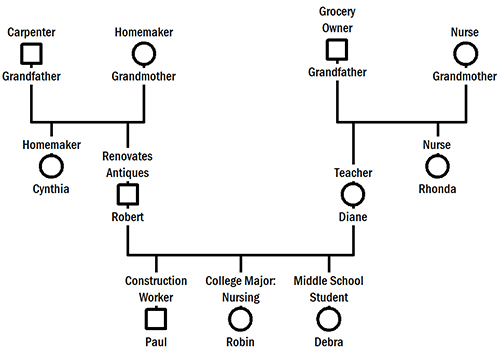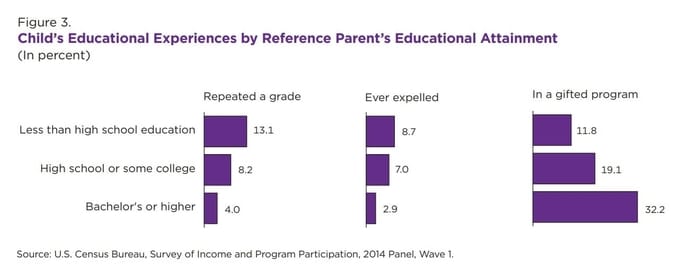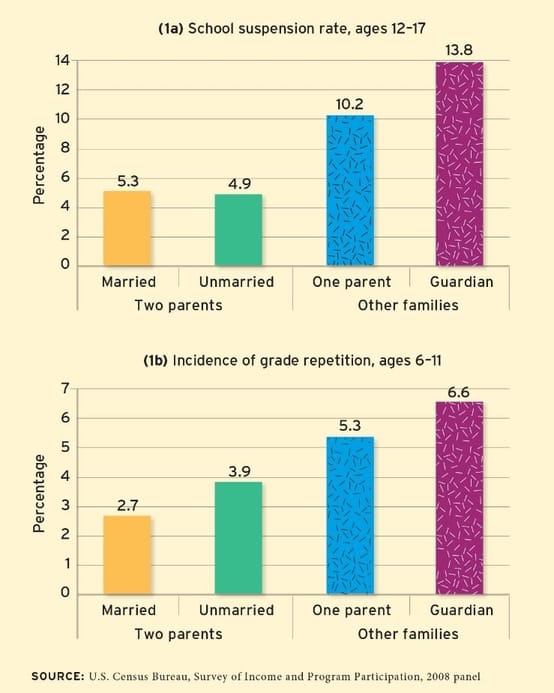How Schools Can Benefit From Genograms
There are typically two areas of concern that arise from students in a school setting: career selection and academic performance. These two have a significant impact on a child’s future, which is why keen observation and appropriate guidance are needed to ensure the children, as well as their parents, are on the right path.
Career Selection
A career counselor helps students identify the profession a student wants to take and detail the steps necessary to achieve that goal. One of the tools that help these professionals guide students is a career genogram. Aside from the family ties and health history, a genogram can also reveal a person’s educational background, occupations, and interests.
 A simple career genogram
A simple career genogram
School counselors use genograms to determine how the career choices of a student are influenced by their family background. Patterns in the type of career chosen by the majority of individuals in the lineage can produce expectations on what the future generations should take.
For instance, parents from a family of lawyers might expect their children to take up law school too. It’s all well and good if the child has a similar thing in mind, but problems arise when they have a different goal they want to achieve.
A child’s decision on the career path they should take is often modeled by family influences. Performance-oriented parents are more likely to get involved in their children’s career development.
Research shows that students who feel the love and support of their parents have more confidence in choosing a career they know they’ll enjoy. On the contrary, rebellious tendencies manifest on students who disagree with their parents regarding the career path they want to take.
In career selection, the following factors affect children’s perception:
- Parents’ expectations.
- Examples set at home.
- Values reinforced within the family and even in the community.
- The opportunities the child gets to learn about themselves and what they can do.
- The quality of the parent-child relationship.
Genograms can reveal information about these factors so that counselors can better guide students in the career they want to pursue.
It’s not rare for a counselor to encounter a student getting depressed over their career choices. Oftentimes, the reason behind is their parent’s disagreement and the negative reaction these children receive when they open up about the career they want to pursue.
Using genograms, counselors can understand where the parents are coming from. It’s possible that the parents experienced financial hardships during their time, and they don’t want their children to undergo the same challenges by choosing a career wherein money is hard to come by. This is a normal reaction but there’s also nothing good that will come from shooting down their children’s hopes about their future careers.
Armed with better information about the family’s history, guidance counselors can perceive a better plan on how to approach both parties. They can devise ways to make the parents understand that their role is to facilitate and not dictate their children’s career journey. On the other hand, they can also to children on being more open-minded on their parents’ perspective.
Academic Performance and Social Behavior
Poor school performance stems from a variety of reasons including the lack of school funding, outdated equipment, low teacher morale, inadequate teaching salary, and gaps in teaching methods. Surprisingly, contrary to popular assumptions, these factors aren’t necessarily the cause of a student’s bad academic performance and delinquent behavior.
According to the Coleman Report, school facilities and staffing, in many cases, have little to do with the achievement level of students; family background plays the most vital part in improving a child’s academic development and behavioral upbringing.
Many were astounded with the discoveries stated in the Coleman Report, especially when the government has been putting billions of public funds in improving education inputs like infrastructure, equipment, and teaching methods. Subsequent studies, however, corroborated the results of the report.
In an essay made by Anna J. Egalite, an assistant professor working in the North Carolina State University, she stated four major family variables that may greatly influence student achievement:
Parental education
Parents who have attained better education are more meticulous in the credentials of the school where they’re putting their children in. They’re also more active in participating in parent-teacher sessions where discussions about improvements in education are held.
 Child's educational experiences in relation to their parent's educational attainment
Child's educational experiences in relation to their parent's educational attainment
(Source: U.S. Census Bureau)
Learning starts from home as several studies have revealed that parental education is the single, most influential factor in the success of a child in school. The interaction that happens at home after school affects the child’s learning ability, as children adopt their parents’ vocabulary, behaviors, and cultural preferences.
Family income
The resources available to the family enable parents to live in neighborhoods with schools providing a higher quality of education. They also have better access to extracurricular activities that will expand the skills and knowledge of their children.
On the other hand, parents who are struggling to make money usually lack the time to interact with their children and ask how they’re doing in school. Juggling multiple jobs, with some having inconvenient shifts, rob parents the time to make it to family dinners, school activities, and performances of their kids.
Parental incarceration
Children with incarcerated parents suffer the greatest emotional strain that highly impact their academic performance. They’re at risk of being homeless, aside from the fact that their main support system is in shambles.
Family structure
The complexity of living arrangements between partners also impact the academic performance of children at home. This occurrence is more commonly seen in the marginalized sector wherein the two-parent setup has a higher risk of vanishing.
 Incidence of suspension rates and grade repetition
Incidence of suspension rates and grade repetition
(Source: EducationNext)
The incidence of grade repetition and school suspension are more prevalent in households with a single parent or guardian functioning as the main support of the family.
The preference of cohabitation over marriage oftentimes produces an unstable partnership that can result in its dissolution after a few years. For instance, the absence of the father is seen to have a large effect on adolescent boys’ social and emotional development, as well as their educational attainment.
All these bits of information can be revealed using a genogram. The parents’ educational attainment, the family structure, and the relationship between family members can all be derived by having students draw a genogram. This will be helpful especially in addressing problem students who are poorly performing or are exhibiting delinquency.
Inequalities caused by differing family backgrounds greatly affect a child’s performance and it is the job of schools to neutralize this circumstance. Through a genogram, these kinds of situations can be quickly identified through guidance counseling. School intervention can be further improved to cater to needy students looking for a helping hand to get through their situation.
Schools alone won’t be able to quickly bridge the gap created by family background. They need the help of the government and other institutions to introduce a major change in the community.
But that doesn’t mean improving educational programs is futile. By leading through example, schools can gradually inspire others to foster an environment which provides equal opportunity to students. Schools can become thepillar of support of the students to help them do better in their academics and be more confident in pursuing their career goals.
Conclusion
The school is said to be the second home of children, and teachers the second parents. But for this to be true, academic institutions must provide equal opportunity to students, especially to those who are facing challenges within their family.
With the help of genograms, guidance counselors can immediately determine the reason behind a child’s underperformance and behavioral changes. Using the information gathered, they can plan for an intervention to help parents understand their children’s needs. Counselors and social workers can work hand-in-hand to help the school come up with programs that will cater to students who are having trouble with their studies despite showing signs of promise.
Genograms can be easily created with GenoPro. The software is the most intuitive tool school counselors can use to trace a student’s background and understand their causes of concern. Strategies to improve their performance can be better devised through the knowledge obtained, ultimately uplifting the reputation of the school and the students.